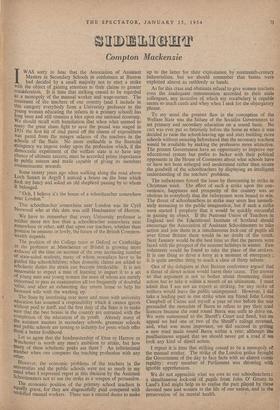Compton Mackenzie
IWAS sorry to hear that the Association of Assistant Masters in Secondary Schools in conference at Buxton had decided by a small majority not to start a strike with the object of gaining attention to their claims to greater consideration. It is time that striking ceased to be regarded as a monopoly of the manual worker and wage-earner. The treatment of the teachers of our country (and I include in this category everybody from a University professor to the Young woman educating the infants in a primary school) has long been and still remains a blot upon our national economy. We should recall with humiliation that when what seemed to many the great sham fight to save the pound was waged in 1931 the first bit of rind pared off the cheese of expenditure was pared from the meagre salaries of the teachers in the schools of the State. No more creditable is the financial stringency we impose today upon the profession which, if the democratic experiment of the welfare state is to have any chance of ultimate success, must be accorded prime importance in public esteem and made capable of giving its members commensurate rewards.
Some twenty years ago when walking along the road above Loch Sunart in Argyll I noticed a house on the brae which took my fancy and asked an old shepherd passing by to whom it belonged.
" Och, I believe it's the house of a schoolteacher somewhere near London."
This schoolteacher somewhere near London was Sir Cyril Norwood who at this date was still Headmaster of Harrow.
We have to remember that every University professor is neither more nor less than a schoolteacher somewhere near somewhere or other, and that upon our teachers, whether their position be eminent or lowly, the future of the British Common- wealth depends.
The position of the College tutor at Oxford or Cambridge or the professor at Manchester or Bristol is growing more arduous all the time on account of the ever increasing number of state-aided students, many of whom nowadays have to be guided like schoolchildren; when domestic claims are added to scholastic duties the strain can become intolerable. It is not reasonable to expect a man of learning to impart it to a set of young men and young women the mass of whom are merely concerned to pass an examination all too frequently of doubtful value, and after an exhausting day return home to help his harassed wife with the washing up. up to the latter for their exploitation by nineteenth-century industrialism, but we should remember that brains were exploited almost as ruthlessly as hands.
As for this crass and obstinate refusal to give women teachers even the inadequate remuneration accorded to their male colleagues, any invective of which my vocabulary is capable seems so much curds and whey when I seek for the objurgatory phrase.
To my mind the greatest flaw in the conception of the Welfare State was the failure of the Socialist Government to set primary and secondary education on a sound basis. No cart was ever put so fatuously before the horse as when it was decided to raise the school-leaving age and start building more schools without ensuring beforehand that the necessary teachers would be available by making the profession more attractive. The present Government have an opportunity to improve our educational system but prefer to bicker with their political opponents in the House of Commons about what schools have or have not been enlarged and modernised rather than secure the goodwill of the schoolteachers by displaying an intelligent understanding of the teachers' problems.
The railwaymen forced the issue by threatening to strike in Christmas week. The effect of such a strike upon the con- venience, happiness and prosperity of the country was so obvious to everybody that the railwaymen were bound to win. The threat of schoolteachers to strike may seem less immedi- ately menacing to the public imagination, but if such a strike were started I prophesy that it would be quickly successful in gaining its object. If the National Union of Teachers in England and the Educational Institute of Scotland should encourage the Association of Assistant Schoolmasters to take action and join them in a simultaneous lock-out of pupils all over Great Britain there would be no doubt of the result. Next January would be the best time so that the parents were faced with the prospect of the summer holidays in winter. Few, volunteers would be found to take the place of the strikers. It is one thing to drive a lorry at a moment of emergency it is quite another thing to teach a class of thirty infants.


































 Previous page
Previous page